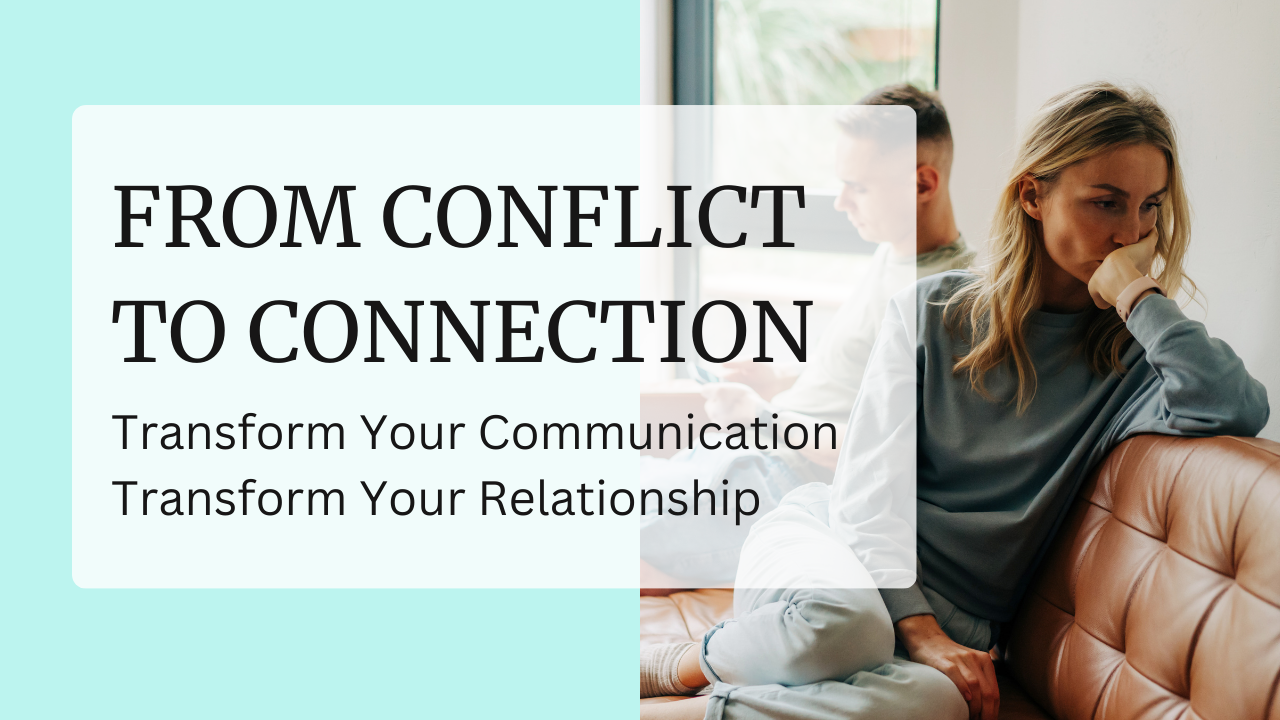46. How to Prepare for a Hard Conversation With Your Partner
How to Have Hard Conversations With Your Partner (Without Spiraling Into Anxiety)
Struggling with communication in your relationship? These 3 tips will help you approach difficult conversations with confidence, clarity, and care.
Why It’s So Hard to Talk About Hard Things in Relationships
Let’s be real: knowing how to have hard conversations with your partner isn’t something most of us were taught.
Whether it’s about unmet needs, emotional disconnection, boundaries, or just asking for something different, difficult conversations in relationships can bring up anxiety, fear, and even guilt. You may worry about starting a fight, being misunderstood, or hurting someone’s feelings.
But avoiding communication doesn’t fix the issue. In fact, it can lead to resentment, confusion, or feeling completely unseen. If you’ve been avoiding tough conversations, hoping the situation will get better on its own, you’re in good company--a lot of us have been there.
The good news? You can learn how to have conversations your partner in a way that’s honest, respectful, and emotionally grounded—even when the topic feels big or overwhelming.
While there is a lot that goes into feeling more comfortable with this in general, here are three practical, relationship communication tips to help get you started by feeling more prepared before your next hard conversation.
1. Get Clear on What You Want From the Conversation
Before you open your mouth, take a moment to get clear with yourself.
Ask:
-
What is the real reason I want to have this conversation?
-
Do I want to feel heard?
-
Am I hoping for a change in behavior?
-
Do I need to express something I’ve been holding in?
Too often, conversations go sideways because expectations aren’t clear. You might want your partner to listen, but they think you're asking for advice. Or you might want something to change, but you never directly ask for it.
Clarity helps you stay grounded—and it helps your partner respond better. Whether you’re talking about emotional needs, setting boundaries in your relationship, or simply expressing how you feel, knowing your “why” is the first step toward success.
💡 Pro tip: Jot down one sentence that captures what you’re hoping for. It will help you stay focused and avoid getting derailed.
2. Make Sure It’s the Right Time
Even when you finally build up the courage to speak, the timing matters.
Your partner might be walking in the door after work, mentally checked out after a long day, or mid-task with something else on their mind. If they’re not fully present, even a well-intentioned conversation can feel frustrating or lead to misunderstanding.
That’s why one of the simplest—but most effective—relationship communication tips is to ask before you begin:
-
“Is now a good time to talk?”
-
“I’d like to share something important with you—can we find a time that works for both of us?”
This helps your partner prepare emotionally and mentally, and it shows respect for their capacity. If they say no, don’t panic or shut down. Instead, respond with curiosity and collaboration:
-
“Totally understand. When would be a better time?”
It may seem small, but this step can reduce defensiveness and help ensure the conversation actually lands.
3. Let Them Know How Long It Will Take
This is one of the most overlooked (but powerful) ways to make difficult conversations in relationships smoother: give a time estimate.
Why? Because it manages expectations and helps your partner stay present.
If they assume it’s a 5-minute chat and it turns into a 45-minute emotional deep-dive, frustration can build. But if you say upfront, “This will take about 20 minutes,” they’re more likely to give you their full attention without feeling blindsided.
Try these phrases:
-
“I just need about 10 minutes to talk something through.”
-
“This might be closer to a 30-minute conversation. When would be a good time for that?”
When you share the time frame, you’re helping them show up—and helping you feel more confident and supported.
A Quick Recap: How to Talk to Your Partner About Hard Things
Here’s a summary of what we covered so you can bookmark this for later:
✅ Be clear about what you want – Understanding your desired outcome sets the tone and gives you direction.
✅ Check the timing – Create emotional safety by making sure it’s a good time to talk.
✅ Set expectations – Let them know how long it will take so you both feel more grounded.
These steps don’t guarantee a “perfect” outcome, but they give you structure, clarity, and emotional support going in—which makes it more likely the conversation will feel productive rather than painful.
If You’re Still Feeling Anxious, That’s Okay
Learning how to have hard conversations with your partner doesn’t mean you won’t feel nervous. You can feel shaky and still speak up. You can be unsure and still honor your truth.
It takes courage to ask for what you need.
It takes practice to use your voice.
And it takes compassion—to trust that you can do both with love.
If you're someone who tends to keep the peace, avoid conflict, or feel unsure of your worth in the relationship, know this: these conversations are an important part of reconnecting with yourself, not just your partner.
You Deserve to Be Heard
The more you practice these steps, the more natural it will feel to advocate for your needs and express your truth without guilt. And that’s not just good for communication—it’s essential for deeper connection, emotional safety, and mutual respect in your relationship.
So the next time you feel that urge to speak up, take a breath. Come back to these tips. And trust yourself.
You’re allowed to take up space.



